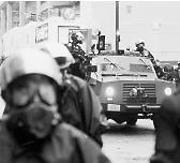State patrol chief Annette Sandberg’s criticisms of the Seattle Police Department’s security planning and tactics at the World Trade Organization demonstrations last December have drawn an in-kind response: same to ya. “Sandberg?” says a high-ranking Seattle police commander. “She was one big pain.”
The Washington State Patrol leader recently told a city WTO review panel she threatened to pull out all her 600 troopers in a tactical dispute with Seattle police. She also complained the city pocketed WTO funds instead of sharing them with outside agencies, and she rapped the mayor’s office for its political interference (see “Inside the WTO command center,” SW, 4/27).
Though many Seattle cops are critical of their department’s actions, said the commander—a Seattle officer for three decades who asked his name not be used—Sandberg was part of the problem, too.
“She threatened to pull out her troops whenever she disagreed with something,” says the commander, who was on the line for 90 hours WTO week. “She wouldn’t turn over or share her command. When an order was given, she’d give it separately to her troopers. You had two armies, going different ways.”
Troopers lacked preparation and weren’t trained for street duty, he says, recalling that one asked him for ID even though the commander was in full police gear, driving a department SUV. “All I’m saying is that Sandberg hasn’t much room to complain.”
Sandberg also told reviewers the SPD Criminal Intelligence Section had the potential for leaks and outside agencies were reluctant to share secrets. That mistrust may have been the first fissure in a security process that, aided by inept planning and reaction, went into meltdown the first day. The chief said her agency and most others do not share sensitive information with Seattle because of a city ordinance that prevents, for one, gathering intelligence on political groups. If agencies were to pass along intelligence of that sort, the thinking goes, Seattle might be compelled to release it if publicly requested.
However, gathering intelligence on the band of Eugene anarchists who posed a violent threat to the city would certainly have been permissible, for example. The commander thinks outside agencies may not fully understand the Seattle law, which Mayor Paul Schell and the SPD are proposing to change.
Besides, the commander says, the problem wasn’t intelligence but the lack of response to it. “We knew about the violent threats ahead of time, be sure of that. But [former Police Chief Norm] Stamper had no tactical plan other than to hang back and let it all happen.”
Sandberg told reviewers the SPD and mayor decided in advance to turn the city over to demonstrators on opening day—to “let them have their day” as she put it. That was when a few violent protesters trashed parts of downtown.
“We knew before they broke into Starbucks and NikeTown and elsewhere that they were going to do it. We had that intelligence,” says the commander. “We knew it when it was happening, too. But when we informed the command center, they waited and waited, and—15 minutes later—said go! When we got there, it was over. That wasn’t an intelligence problem—other than with someone’s head.”








